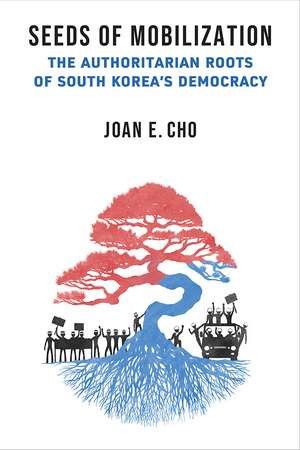Seeds of Mobilization: The Authoritarian Roots of South Korea's Democracy: Emerging Democracies
Autor Joan E. Choen Limba Engleză Hardback – 13 feb 2024
By using original subnational protest event datasets, government publications, oral interviews, and publications from labor and student movement organizations, Joan E. Cho takes a long view of democratization that incorporates the decades before and after South Korea’s democratic transition. She demonstrates that Korea’s democratization resulted from a combination of factors from below and from above, and that authoritarian development itself was a hidden root cause of democratic development in South Korea. Seeds of Mobilization shows how socioeconomic development did not create a steady pressure toward democracy but acted as a “double-edged sword” that initially stabilized autocratic regimes before destabilizing them over time.
Preț: 478.96 lei
Preț vechi: 591.31 lei
-19% Nou
Puncte Express: 718
Preț estimativ în valută:
91.66€ • 95.21$ • 76.14£
91.66€ • 95.21$ • 76.14£
Carte indisponibilă temporar
Doresc să fiu notificat când acest titlu va fi disponibil:
Se trimite...
Preluare comenzi: 021 569.72.76
Specificații
ISBN-13: 9780472076604
ISBN-10: 0472076604
Pagini: 276
Ilustrații: 14 tables, 29 figures
Dimensiuni: 152 x 229 mm
Greutate: 0.45 kg
Editura: UNIVERSITY OF MICHIGAN PRESS
Colecția University of Michigan Press
Seria Emerging Democracies
ISBN-10: 0472076604
Pagini: 276
Ilustrații: 14 tables, 29 figures
Dimensiuni: 152 x 229 mm
Greutate: 0.45 kg
Editura: UNIVERSITY OF MICHIGAN PRESS
Colecția University of Michigan Press
Seria Emerging Democracies
Notă biografică
Joan E. Cho is Assistant Professor of East Asian Studies, and Assistant Professor by courtesy of Government, at Wesleyan University.
Cuprins
List of Figures
List of Tables
Abbreviations
A Note on Romanization
Acknowledgments
1. Introduction: Re-examining South Korea’s Democratization
2. Industrialization as a (De)stabilizing Force
3. Manufacturing Protests: Ecology of Industrial Complexes and Development of the Labor Movement
4. Learning to Dissent: Education and Authoritarian Resilience
5. From College Campuses to Ballot Boxes: Mobilizing for Democratic Reforms
6. Beyond the Democratic Transition: Democratization and Generational Divide in South Korea
7. Conclusion: Development, Democracy, and Authoritarian Legacy
Appendix: Datasets and Data Sources
Bibliography
Index
List of Tables
Abbreviations
A Note on Romanization
Acknowledgments
1. Introduction: Re-examining South Korea’s Democratization
2. Industrialization as a (De)stabilizing Force
3. Manufacturing Protests: Ecology of Industrial Complexes and Development of the Labor Movement
4. Learning to Dissent: Education and Authoritarian Resilience
5. From College Campuses to Ballot Boxes: Mobilizing for Democratic Reforms
6. Beyond the Democratic Transition: Democratization and Generational Divide in South Korea
7. Conclusion: Development, Democracy, and Authoritarian Legacy
Appendix: Datasets and Data Sources
Bibliography
Index
Recenzii
“Joan Cho unpacks the long-term impact of economic development in South Korea on both worker and student organizations, and its consequent impact on democratization. Her nuanced theory on the sociopolitical impact of industrial complexes and labor unions, as well as that of college campuses and student organizations, is a very welcome contribution to the burgeoning literature on democratization, especially on South Korea.”
“In this richly researched and elegantly written book, Joan Cho uses the case of South Korea to make an original and nuanced argument about how the geospatial patterns of industrial and educational policies bolstered authoritarian durability initially but also unintentionally laid the organizational foundations off which social forces mobilized to democratize Korea.”
“Joan Cho revisits the long-standing puzzle of why economic development—over the long-run—is likely to generate democratic outcomes. She shows how this may not initially prove true as the returns from authoritarian-led growth accrue to incumbents. Rather it is the formation of an independent and concentrated civil society—for example workers in firms or students in universities—that bring pressure to bear. While tackling the Korean case, the argument has implications for China and other cases where controls on social organization have slowed democratic pressures that would otherwise arise.”
"In this case study, Cho uniquely blends insightful description with rigorous hypothesis-testing, using electoral, protest, county, and other subnational-level data to show how the Korean autocrats' top-down industrial and educational policies created, over the long term, bottom-up pressures from significant, nationally organized social forces as labor. Rated: highly recommended."
Descriere
Examines the roles of industrialization and tertiary education in Korea’s nonlinear path to democracy














